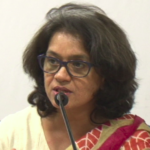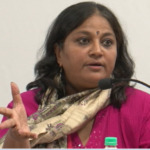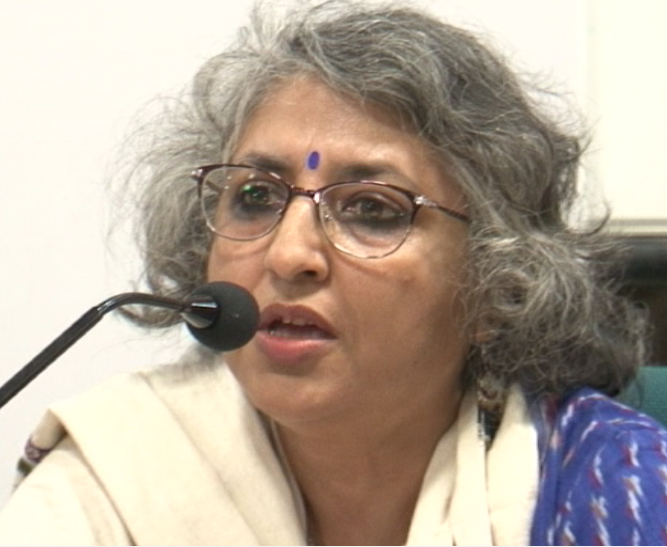Session 4. Taking positions within and vis-a-vis institutions: interpreting the law, negotiating the law
The session explored due process and critical feminist conversations on gender-based cyber violence with institutional actors and student communities. Challenges to, as well as opportunities for, rights and justice were highlighted, and transformative potential for conversations across institutions explored.
Speakers
Veena Gowda, Advocate, Bombay High Court, Mumbai
Trupti Panchal, Special Cell for Women and Children, Mumbai
Karuna Nundy, Advocate, Supreme Court of India, New Delhi
Shewli Kumar, Gender Amity Committee, TISS, Mumbai
Ditilekha Sharma, TISS Queer Collective
Chair
Asha Achuthan, Advanced Centre for Women’s Studies, TISS, Mumbai
Existing legal-institutional frameworks on sexual harassment: Are they effectively addressing gender-based cyber violence?

Veena Gowda, Advocate, Bombay High Court, Mumbai
The jurisprudence on sexual harassment has developed from two important locations – the workplace and educational institutions. In this regard, Internal Complaints Committees (ICC) mandated by the Sexual Harassment of Women at Workplace (Prevention, Prohibition and Redressal) Act, 2013 play a very important role as dispensers of justice. By and large, the law is yet to develop an imagination of gender-based violence mediated through technology. In moving towards such an imagination, law should be more general, as this allows us to dialogue with the law through interpretations. Even if law is rigid, officers and practitioners of law must approach it with a sense of fluidity. The definition of sexual harassment in the Sexual Harassment Act and in Section 354A of the IPC covers any conduct of a sexual nature, whether direct or indirect, that is unwelcome by women. It includes verbal, non-verbal and physical acts, and is wide enough to apply to cases of gender-based cyber violence. The use of the phrase ‘unwelcome’ refers to non-consensual acts, but also shifts the focus to the subjective experience of violence by women. The sexual harassment law, however, is limited to harassment that is sexual in nature, and does not apply to other forms of gender discrimination that result in harassment.
The due process of law must be preserved to ensure a fair trial. For example, in the case of sexual harassment – where there may be no witnesses – the statement of the woman concerned is very important and carries a lot of weightage. But at the same time, her statement should be open to examination and scrutiny and the ICC may also seek corroborative evidence. The burden of procuring digital evidence should not be placed on the complainant alone and the ICC should exercise the option of approaching cyber experts when necessary.

Institutional responses to gender-based cyber violence: Reflections from the experiences of the Special Cell for Women and Children, Mumbai
Trupti Panchal, Special Cell for Women and Children, Mumbai
300 police stations across the country house Special Cells for Women and Children. In the case of the Mumbai Special Cell, of late, most cases involve some element of technology. The digital context is throwing up many issues within the family and outside it, and women are coming forward to seek redress before the Special Cell. Most of these cases of cyber violence fall through at the pre-litigation phase. Not many complaints filed actually proceed to a trial before court.
Control is exercised over women’s access to and use of technology, and control over women is exercised through the use of technology. The Special Cell has seen many cases of intimate partner abuse mediated through technology. Women have been reluctant to complain in such cases as they fear adverse repercussions. For example, when the ex-partner publishes intimate pictures online the woman may worry that if she approaches the police the picture would be sent to her family. The recourse to IT Act is made even more difficult because most women delete contentious material.
While safety is extremely important in cyberspace, it cannot be reduced to an app-based solution or police help lines, neither of which is very effective.
Gender-based cyber violence: Progressive judgments and legal amendments need to be built upon
Karuna Nundy, Advocate, Supreme Court of India, New Delhi
The cases of gender-based cyber violence that are addressed institutionally are really the tip of the iceberg. Some forms of gender-based violence, like marital rape, are not even recognized by the law. Thus, the cases of gender-based violence that do enter the judicial system are minuscule. It is important to remember, however, that there are progressive judgments – on questions of constitutional law – that are being delivered by the higher judiciary. The Puttaswamy judgment that upheld the right to privacy said that the right includes sexual autonomy, bodily integrity, and the right to reproductive choice.
In the 2013 amendment of criminal laws, one important provision was Section 166A of the IPC, which makes it mandatory for police officers to file a First Information Report in certain kinds of crimes. If they refuse to register a case, they can be held liable. Further, First Information Reports for cognizable offenses have to be registered (Lalita Kumari v. Govt. of U.P). If we look at the IT Act, even though the anti-obscenity offenses are hugely problematic (Sections 67 and 67A), since they are cognizable and non-bailable, on an individual level they can bring much-needed relief.
Gender-based cyber violence in university spaces: Challenges for Internal Complaints Committees

Shewli Kumar, Gender Amity Committee, TISS, Mumbai
The digital space is very real. It is also very public, despite the popular narrative of anonymity that usually accompanies it. Sexism is inherited from the offline, but takes new forms in the digital. The experience of the Internet Complaints Committees (ICCs) has been that women facing gender-based cyber violence need extensive handholding and support even before they can be persuaded to make a formal complaint. Sometimes, they may require counseling for even up to six months.
The University Grants Commission (UGC) has issued guidelines that prescribe ICCs to appoint a student representative. In TISS, this has been followed. And the experience of the TISS ICC has been that many a time, cases come up only because of the efforts of the student representative who the student-complainant feels comfortable confiding in.
Unless a complaint is made to the ICC – that is, consent is given by the woman – due process cannot begin. Post-complaint, the ICC must take the effort to provide redress to the victim.
While the UGC has also said that the ICC has to take complaints made by individuals from gender discriminated locations, it has not laid down any guidelines in this regard. While the mandate of the ICC is prescribed by the law, to ensure full justice, it may have to go above and beyond such mandate. But this depends on the level of motivation of the individual members of the ICC.

Incorporating concerns of the queer community in designing institutional responses to gender-based cyber violence
Ditilekha Sharma, TISS Queer Collective
The queer collective has tried to push conversations on violence beyond the gender binary. For a person from the LGBTQI community, the Internet has been the primary source of information. The anonymity that the Internet provides has allowed explorations on gender and sexuality away from surveillance by family and society. It is extremely difficult to separate the virtual world from the real world, especially when you live as your ‘real self’ in the virtual world, which is perceived to be a safer space. This fluidity between the worlds has many implications for consent. For instance, does sharing a particular piece of information online imply consent to sharing it offline?; or again, is participating in a dating website an indication of ‘availability’ offline? In these cases, consent is assumed because of the public nature of the virtual. For someone in the queer community, one of the biggest fears is being outed and so confidentiality has to be constantly stressed upon.
Due process does not account for the concerns of the queer community. In cases of gender-based violence, making a complaint before institutional redress mechanisms becomes difficult for many reasons. Firstly, you are at the risk of outing yourself. Secondly,institutions may ban websites where queer people can meet and/or access queer content. And thirdly, the law in India criminalises homosexuality – and hence by complaining, you put yourself in danger.
User policies of online platforms that stress on the use of ‘real names’ also work against the queer community. When complaints are made against trolling, the first thing that is done is to shut down ‘fake accounts’, which often means alternate accounts set up by persons from the queer community are also taken down. Educational institutions may operate in black and white manner – they may restrict access to YouTube with the intention of blocking access to pornography, but this can also mean that a lot of LGBTQI content that is informative is also filtered out.
Open discussion
Asha Achuthan, the chair, made the following concluding observations.
– One of the positive outcomes of ‘the list versus due process’ debate that happened last year was that it facilitated critical conversations on institutional redress mechanisms and how they can be accessed, at least in some institutions. Further debate and discussion is needed on how due process can respond to concerns of the queer community.
– The interplay of publicness, anonymity and consent is another important point that has been articulated.

Comments from the floor
1. Heteronormativity is encoded in the law, making it very difficult for even feminist lawyers to break out of the gender binary in the interpretation of the law.
2. India does not yet have an anti-discrimination law. Women have always been constructed by the law from the point of view of violence and victim-hood, and it is time we re-looked at the law.
3. A participant raised a question on the steps that the Women’s Special Cell takes after a complaint is received: “Does the Cell recommend that the woman approach the police?”. Trupti Panchal replied that the choice and agency of the women who approach the Special Cell is respected at every step. If she wants to file a police complaint, since the Cell is located within the police station, all support will be provided in this regard. However, in cases of technology-mediated violence, women often delete evidence, making it difficult to put forward an effective case. The Cyber Cell is also not very well-equipped to support with evidence gathering. As technology-mediated violence cases often involve intimate images, complaining to law enforcement would mean sharing these images. This prevents many from approaching law enforcement.
4. There was a question from the floor on whether the term ‘hostile work environment’ in the sexual harassment law includes discriminatory behavior. Panelists responded that the law actually specifies that the hostile environment must arise from sexual conduct. Therefore, wider acts of gender discrimination may not be supported by the Act. But this should not stop a woman from complaining and testing the court for a wider interpretation.
5. A member of the audience wondered if there is anyway that institutional complaints mechanisms could account for informal structures and solidarities. The panelists responded that:
– Some ICCs have tried to incorporate these informal mechanisms especially by having a student representative and working more closely with the student community through formal and informal conversations.
– There is merit in the formal legal system, because a complaint of sexual harassment can follow the accused through his life and career, and so, natural justice must be followed. But, at the same time, women must be empowered to utilize the process.
6. There was a question from the audience on whether the law on digital evidence can be made less cumbersome. The panel reflected that evidence creation has become much easier with the digital. So, the law and courts have to ensure that the evidence before it is verifiable and credible.